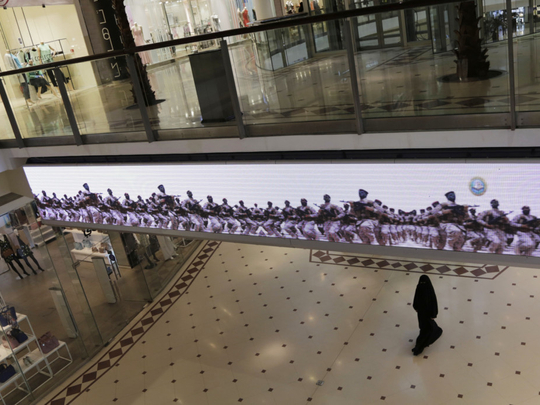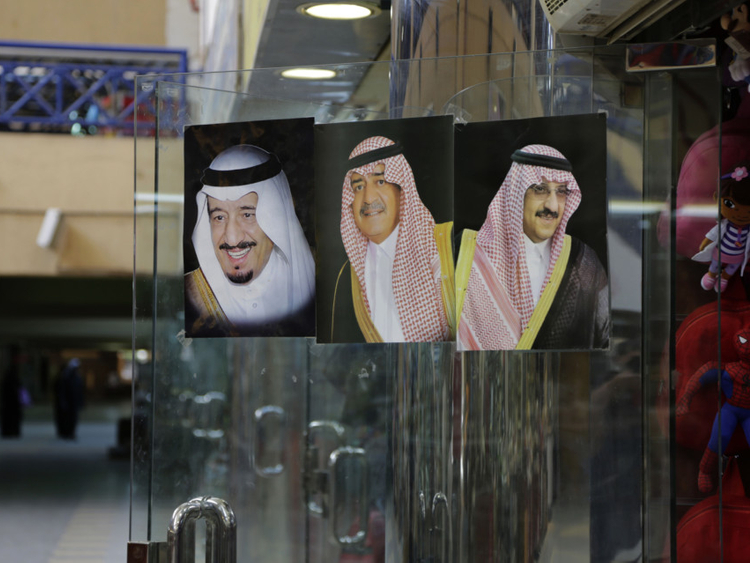
Riyadh: Just weeks into the reign of Saudi Arabia’s new ruler, King Salman Bin Abdul Aziz, wars were raging across two of the kingdom’s borders.
To the north, Daesh militants were threatening the stability of Iraq, which sought help from another of its neighbours, Saudi nemesis Iran. To the south in Yemen, Al Houthi militiamen that had seized control of the capital, Sana’a, last year began advancing on the southern commercial hub of Aden, where the Saudi-backed president had set up a parallel government.
To the Saudis, the implications were clear: Iran, which supports the Yemeni rebels known as Al Houthis, was making a play to extend its reach into their backyard. The response was swift: The king assembled a coalition of fellow Sunni states and launched punishing air strikes in Yemen aimed at reinstating the now-exiled President Abd Rabbo Mansour Hadi.
The operation, now in its fourth week, is a dramatic departure for Saudi Arabia, which has preferred to use diplomacy, cash and religion to defend its interests and influence over the Gulf region. Analysts say the air war signals a shift to a more muscular foreign policy that no longer relies on the United States to take an active role in protecting the country and defending vital shipping lanes for its tankers.
The kingdom has spent billions of dollars on weapons and military infrastructure. But its armed forces have until now played a modest role in the Middle East’s many conflicts, including in continuing US-led air strikes in Iraq and Syria against Daesh.
American passivity
Scholars who study the royal family attribute the new approach to more youthful and less risk-averse Saudi advisers who have started moving into positions of authority. These leaders are fed up with what they view as American passivity in the face of mounting instability in the region, and they worry that nuclear talks with Iran could lead to a rapprochement between longtime enemies Washington and Tehran.
“The fingerprints of this new leadership are there,” said Jamal Khashoggi, a veteran Saudi journalist and general manager of the new Al Arab TV channel. Their approach, he said, is summed up in the name they chose for the operation in Yemen: Storm of Resolve.
Salman, 79, moved quickly to put his stamp on the Saudi leadership when he assumed the throne after the death of his half brother King Abdullah at age 90 in January. Within less than 24 hours, he announced a string of appointments that gave the next generation of royals significant power over policy in the absolute monarchy.
They include Interior Minister Mohammad Bin Nayef, who at a comparatively youthful 55 was named deputy crown prince, putting him in line to become the first grandson of Saudi Arabia’s founder, King Abdul Aziz Al Saud, to become king. The current monarch’s son, Mohammad Bin Salman, was named defence minister and gatekeeper to the royal court.
The defence chief, who is in his 30s and has no previous military experience, has been portrayed as personally directing operations in Yemen. Photographs of him strategising with commanders and making phone calls have been splashed across Saudi newspapers and shared widely on social media.
Saudi military power — much of it purchased from the US — was on display last week as a swarm of local and international journalists was given a tour of battlefield positions atop rugged mountains and along dried-up riverbeds on the 1,000-mile frontier with Yemen. The troops showed off their tanks and fired artillery rounds into the Al Houthis’ northern stronghold to shouts of “God is great!”
“Most people in the gulf countries are happy that the independent action of the gulf states has been restored,” said Mustafa Alani, who heads the department of security and defence studies at the Geneva-based Gulf Research Centre. “It’s a question of dignity.”
High stakes
Saudi leaders have engaged in intensive diplomacy in recent weeks to shore up support for the war effort. King Salman received a visit on Thursday from Bahrain’s King Hamad Bin Eisa Al Khalifa, who commended his counterpart for taking important initiatives “that have saved the region from many dangers,” according to a report in the Arab News.
On Tuesday, the Saudi defence minister was in Egypt, where he met with President Abdul Fattah Al Sissi, who is providing key support to the coalition. They discussed the possibility of joint military exercises with other gulf states in Saudi Arabia, according to a statement released by the Egyptian leader’s office.
The stakes are high for Saudi Arabia, which sees its influence with Washington diminishing as the US reduces its dependence on Saudi oil and approaches a nuclear deal with Iran.
The gulf monarchies were alarmed at the lack of US support for Egypt’s former strongman Hosni Mubarak, who was toppled in the so-called Arab Spring uprisings that swept the region in 2011. The Saudis sent troops into Bahrain that year to protect the Sunni royal family from a Shiite uprising and later intervened with financial help for the military government that carried out a coup in Egypt, moves opposed by the United States.
Iran’s ambitions
The kingdom’s leaders have long argued that the US underestimates the threat posed by Iranian ambitions for regional hegemony. They were especially frustrated that President Barack Obama did not act more forcefully to remove Iranian-backed President Bashar Al Assad from power in Syria, including a failure to punish Al Assad’s government for using chemical weapons or provide substantive military aid to rebel groups.
The Saudis are convinced that Iran, which has used local proxies to extend its influence in Syria, Iraq and Lebanon, is attempting to place another client in power in Yemen. They also worry the conflict could spill over into Saudi Arabia, which has a small Shiite population that has been advocating for greater political and economic rights.
“Iranian success is worrying everyone,” said security researcher Alani, who is close to Saudi Arabia’s rulers. “Are you going to allow this expansionist policy of Iran, this interventionist policy of Iran, to be practised in your backyard in Yemen as well? ... Enough is enough.”
Saudi Foreign Minister Prince Saud Al Faisal accused Iran of meddling in Yemen, saying the kingdom is “not at war with Iran.” Hadi had asked the Saudis to intervene to “protect the legitimacy of the state” and prevent Al Houthis from occupying all of Yemen, Faisal told reporters in the Saudi capital.
On April 13, Russian President Vladimir Putin cleared the way for delivery of sophisticated air defence systems to Iran, a move that threatened to replay the Cold War rivalry with the US on Middle Eastern shores.
Although the Saudis like to emphasise their independence from US policy, Western analysts say their actions thus far have not seriously challenged Western strategic interests in the region. The air strikes in Yemen, for example, have not jeopardised the multinational nuclear talks.
“At the end of the day, the gulf countries are heavily dependent on the US to supply them with arms and training,” said Jane Kinninmont, a Middle East scholar at the Chatham House think tank in London. “The Saudis would have been much more reluctant to do this (campaign in Yemen) if they felt that it would jeopardise their ability to procure arms in the future.”













